Table of Contents
Introduction
The digital world is changing at lightning speed, and search engines have evolved beyond just matching keywords. With AI-powered tools like Google’s Gemini, Bing Copilot, and ChatGPT Search, the way we discover and rank content has been completely revolutionized.
Today’s AI goes beyond simply scanning words — it grasps intent, meaning, and context. It can read user emotions, preferences, and search habits to provide results that are not only accurate but also conversational. This means your content needs to communicate in the same smart language as AI.
To remain visible and competitive, brands and creators must transition from traditional SEO to strategies that are optimized for AI. This guide will take you through the top 10 tips for enhancing your SEO content for AI search, ensuring your brand flourishes in this new age of intelligent discovery.
Understand How AI Search Works
The digital world is changing at lightning speed, and search engines have evolved beyond just matching keywords. With AI-powered tools like Google’s Gemini, Bing Copilot, and ChatGPT Search, the way we discover and rank content has been completely revolutionized.
- Today’s AI goes beyond simply scanning words — it grasps intent, meaning, and context.
- It can read user emotions, preferences, and search habits to provide results that are not only accurate but also conversational.
- This means your content needs to communicate in the same smart language as AI.
To remain visible and competitive, brands and creators must transition from traditional SEO to strategies that are optimized for AI.
#1 How AI Search Differs from Traditional SEO
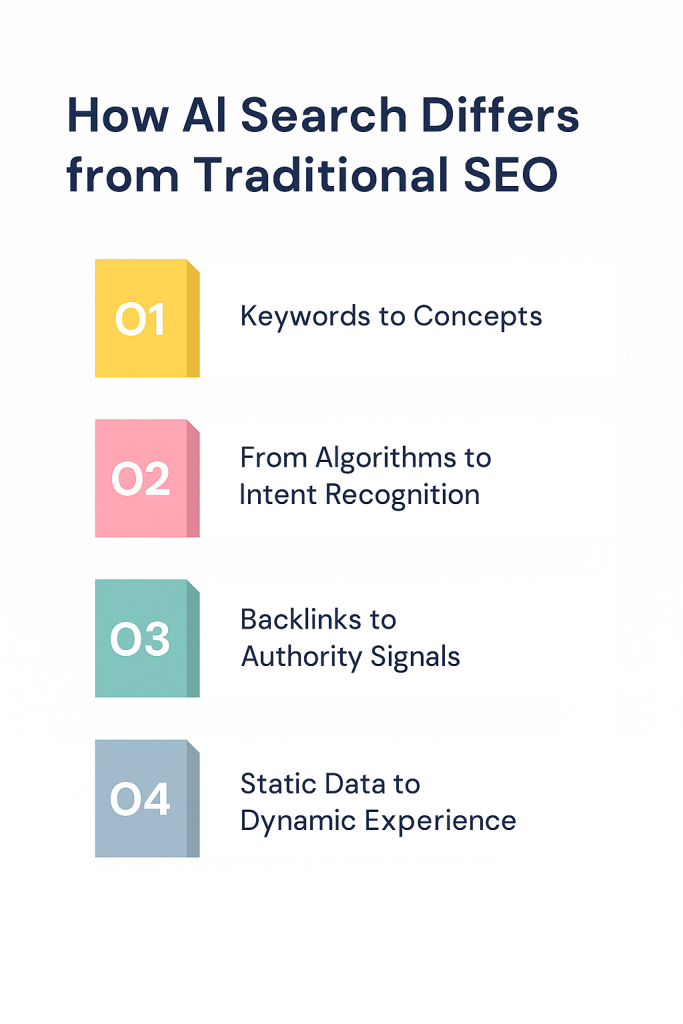
Understanding and addressing search intent is now central to SEO success. AI rewards content that fulfills user expectations while maintaining clarity and logical flow.
- Keywords to Concepts: Traditional SEO relied heavily on keyword repetition. AI search focuses instead on conceptual relationships and semantic understanding, valuing meaning over frequency.
- From Algorithms to Intent Recognition: AI evaluates content based on user satisfaction, tone, and readability. Writing that aligns with human intent performs better than content designed solely for algorithms.
- Backlinks to Authority Signals: While backlinks remain important, AI prioritizes topical expertise, factual accuracy, and trustworthy information as core indicators of authority.
- Static Data to Dynamic Experience: AI measures engagement metrics such as dwell time and interaction. User-friendly, informative, and valuable content signals higher relevance to search systems.
#2 Focus on Search Intent
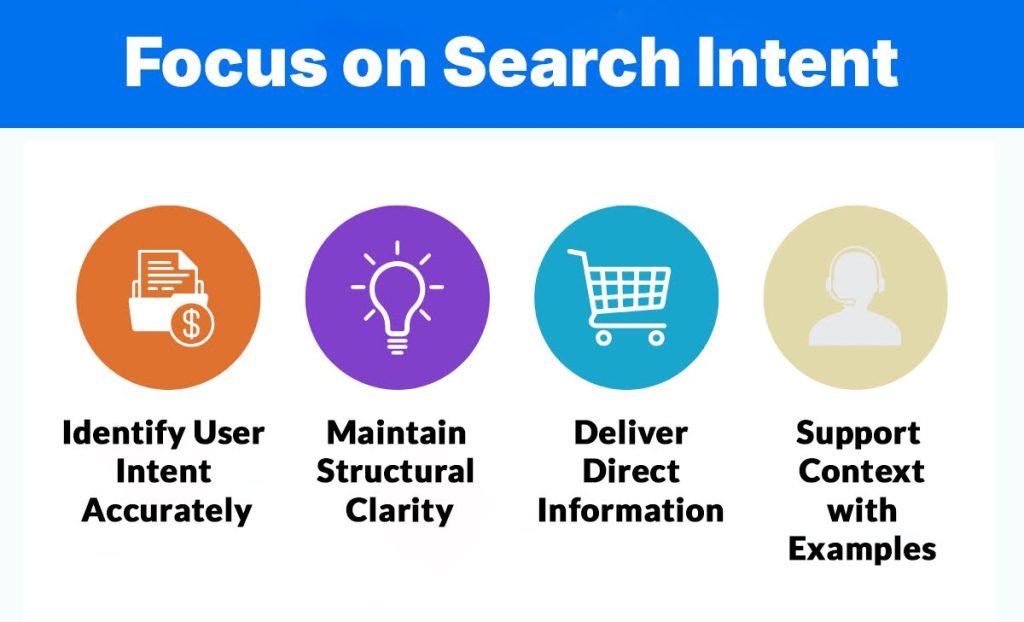
Understanding and addressing search intent is now central to SEO success. AI rewards content that fulfills user expectations while maintaining clarity and logical flow.
- Identify User Intent Accurately: Recognize the type of information your audience seeks—educational, comparative, or commercial—and align your content accordingly.
- Deliver Direct Information: AI favors content that answers questions quickly and effectively. Clear, actionable insights enhance both user experience and ranking potential.
- Maintain Structural Clarity: Avoid vague or overly complex phrasing. Logical flow and well-defined sections enable AI to better understand and categorize your content.
- Support Context with Examples: Reinforce your ideas through relevant examples or case studies. Concrete references help AI systems and readers connect your content to practical outcomes.
#3 Use Conversational Language
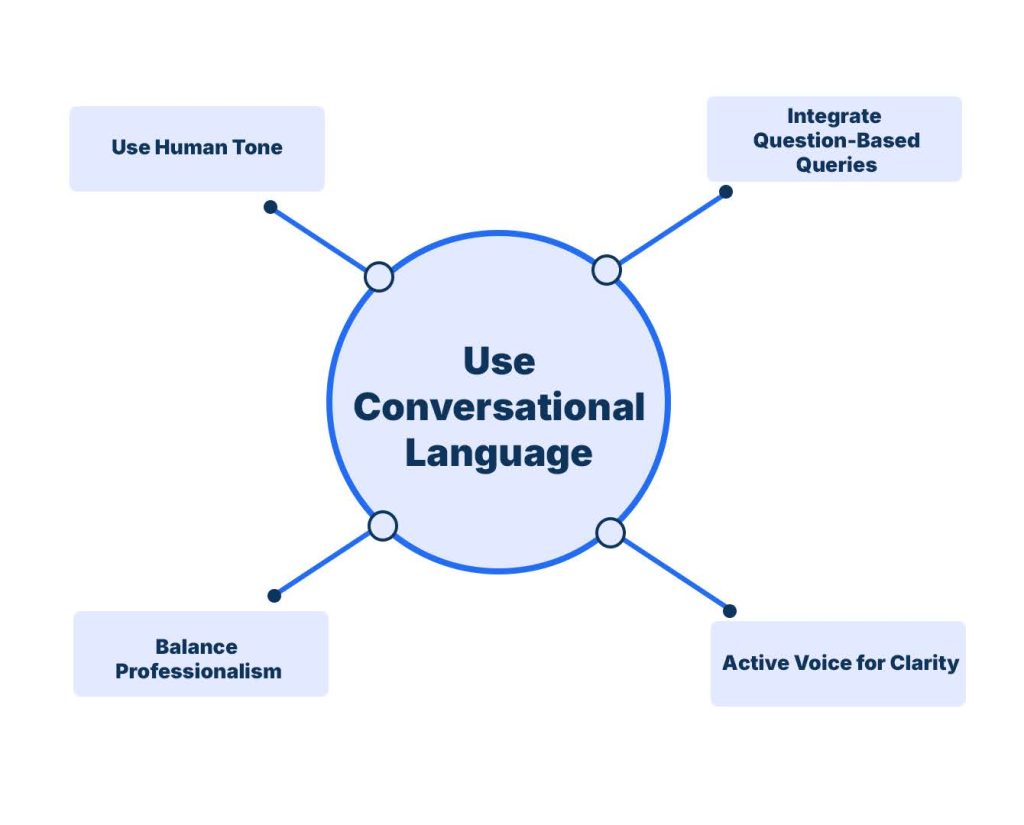
AI systems like Google’s Search Generative Experience (SGE) are designed to mirror human conversation. Writing naturally and conversationally helps your content appear in AI-powered results and voice searches.
- Use Human Tone: AI models interpret conversational content more effectively. Replace rigid phrasing with smooth, human-like communication.
- Integrate Question-Based Queries: Incorporate phrases users might voice directly, such as “How can I improve AI-based SEO?” to match conversational search patterns.
- Balance Professionalism: Maintain a professional tone while ensuring the text feels natural and engaging. Readability fosters higher user retention and better AI comprehension.
- Active Voice for Clarity: Address readers directly and write in active voice. It improves engagement and helps AI determine intent and purpose more effectively.
#4 Optimize for Semantic SEO
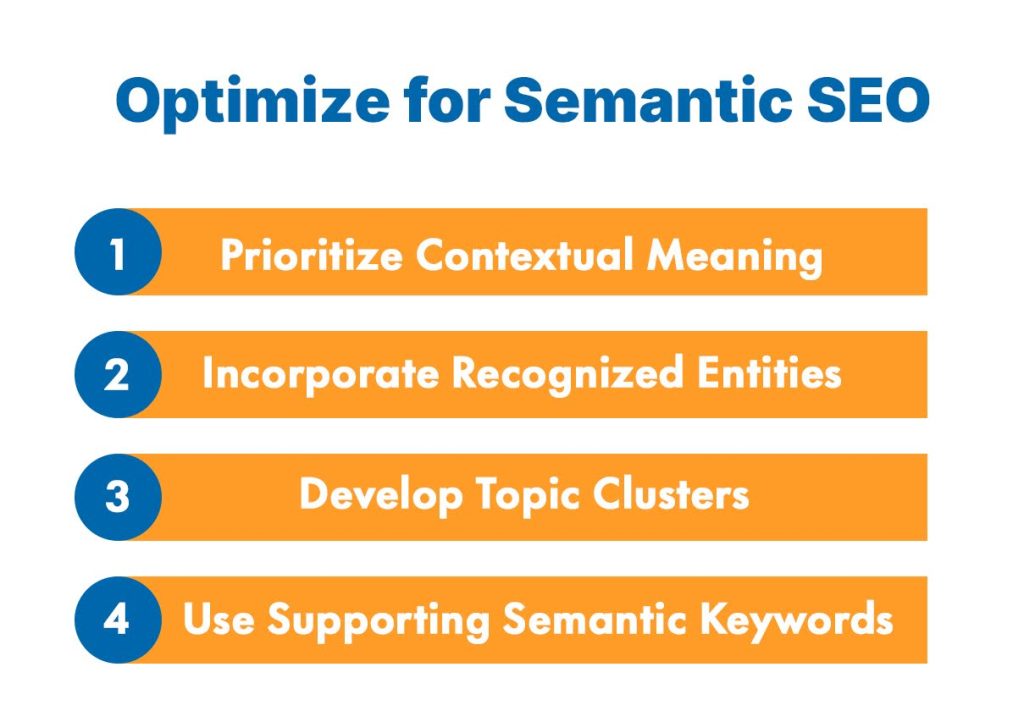
Semantic SEO helps AI connect your content with broader topics, entities, and intent. By focusing on meaning and relationships, you make your content more discoverable and contextually relevant.
- Prioritize Contextual Meaning: Semantic SEO focuses on meaning and relationships between concepts, enabling AI to better understand topic relevance.
- Incorporate Recognized Entities: Include identifiable names, places, and organizations to strengthen associations within AI knowledge graphs.
- Develop Topic Clusters: Interlink related pages to signal topical depth and authority. This structure improves indexing and boosts thematic strength.
- Use Supporting Semantic Keywords: Add related terms and synonyms to broaden context and ensure AI comprehends the full scope of your content.
#5 Leverage Structured Data
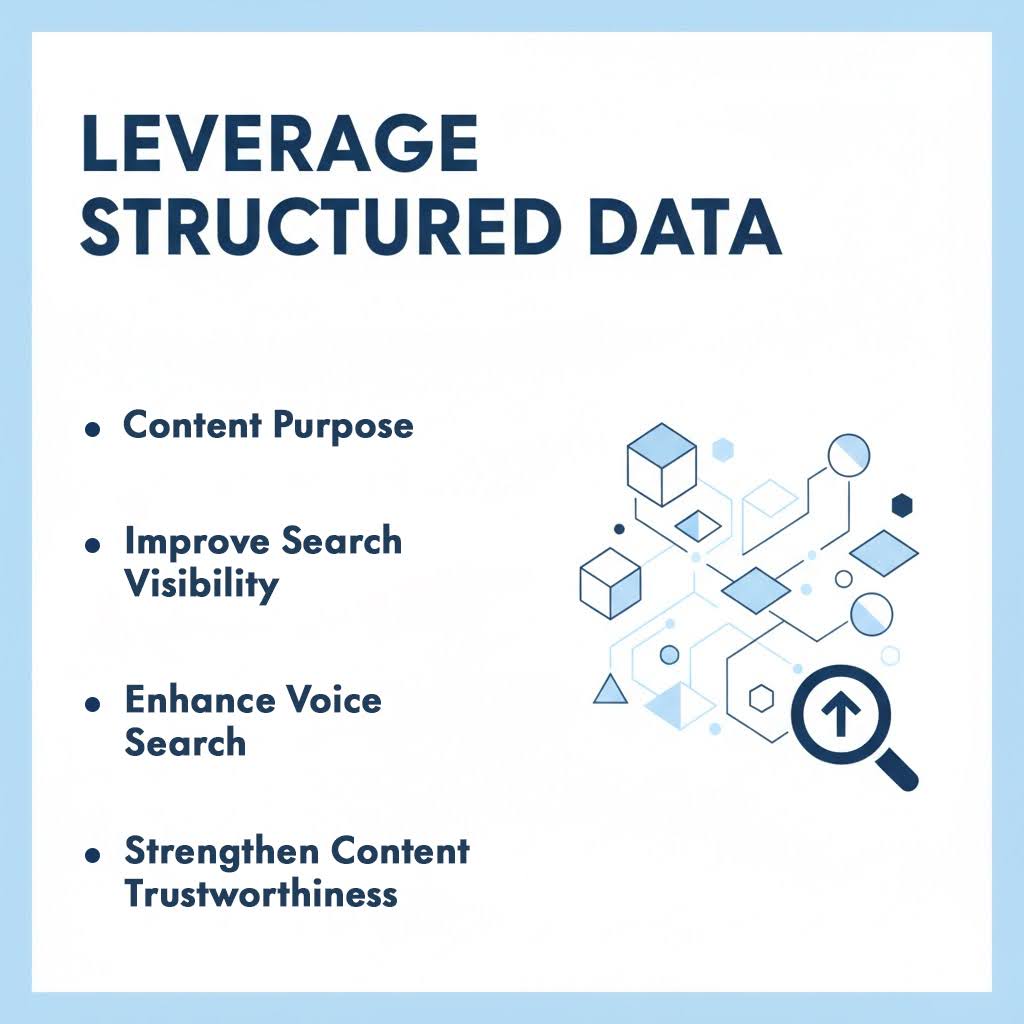
Structured data helps AI search engines interpret your content with precision. Schema markup gives clear signals about your content type and purpose, improving visibility and engagement.
- Content Purpose: Structured data communicates the type of content—such as articles, FAQs, or reviews—making it easier for AI to categorize.
- Improve Search Visibility: Schema markup increases the likelihood of appearing in featured snippets and rich results, driving higher click-through rates.
- Enhance Voice Search: Structured formats allow AI assistants to extract accurate, concise answers for spoken queries.
- Strengthen Content Trustworthiness: By making your content more machine-readable, structured data reinforces credibility and increases search engine confidence.
#6 EEAT-Driven Content
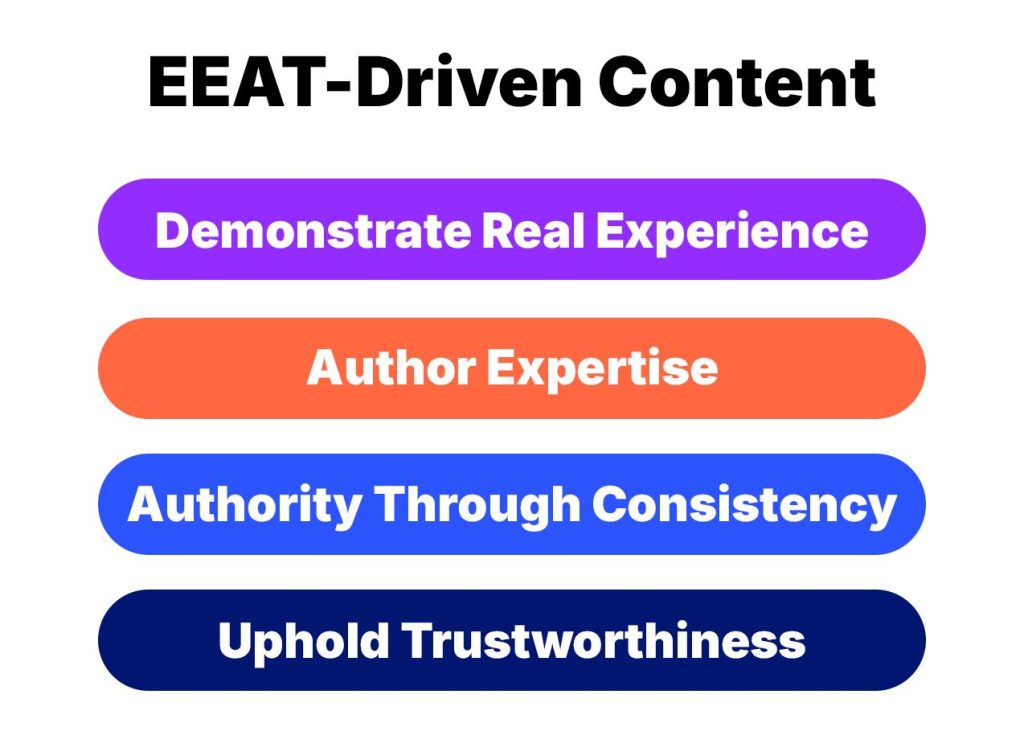
AI search engines tend to favor content that showcases credibility and reliability. The concept of EEAT—Experience, Expertise, Authoritativeness, and Trustworthiness- signals to AI that your content is a valuable and accurate resource for users.
- Demonstrate Real Experience: Incorporate firsthand insights, case studies, or practical examples that showcase genuine expertise and experience.
- Author Expertise: Provide author bios, credentials, or professional achievements to validate subject matter authority.
- Authority Through Consistency: Publish consistently within your niche to strengthen your position as a reliable source of information.
- Uphold Trustworthiness: Fact-check, cite credible sources, and ensure content accuracy to enhance user and AI confidence.
#7 Optimize for AI Audio Searches
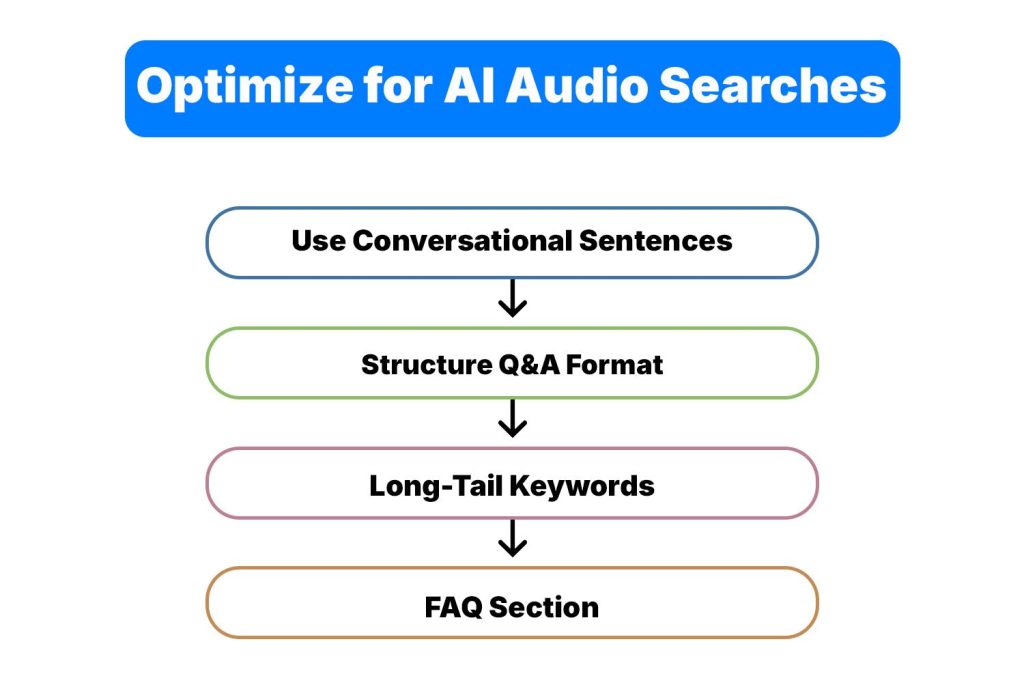
Voice searches are really changing the way we interact with the internet. Instead of just typing out short phrases, people are now speaking in full, natural sentences.
- Use Conversational Sentences: Voice searches are phrased naturally. Craft content that flows smoothly and sounds authentic when read aloud.
- Structure Q&A Format: Include clear, question-based headings followed by concise answers to align with AI assistant response styles.
- Long-Tail Keywords: Use full, natural-sounding phrases such as “best SEO strategies for AI search engines” to match spoken query patterns.
- FAQ Section: Frequently Asked Questions directly target voice search behavior and increase your visibility across voice-enabled platforms.
#8 Enhance User Experience
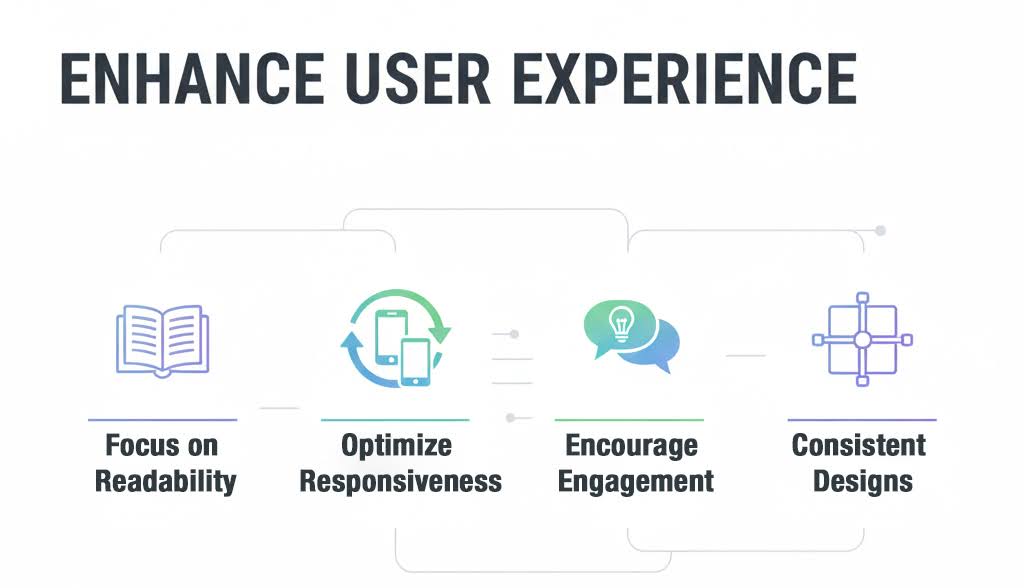
AI-driven search engines are really tuned in to how users engage with your content. Things like bounce rate, dwell time, and click-through rate help AI figure out if your page is a hit or a miss. The more enjoyable the experience, the better your ranking signals will be.
- Focus on Readability: Organize content with headings, short paragraphs, and visual elements to improve user comprehension and scanning ease.
- Optimize Responsiveness: Ensure fast loading times and seamless mobile compatibility, as AI prioritizes user-friendly experiences.
- Encourage Engagement: Interactive elements such as polls, comments, or calls-to-action increase dwell time and signal value to search algorithms.
- Consistent Designs: A well-designed, intuitive interface reinforces credibility and enhances user satisfaction, improving ranking performance..
#9 AI Tools for SEO Optimization
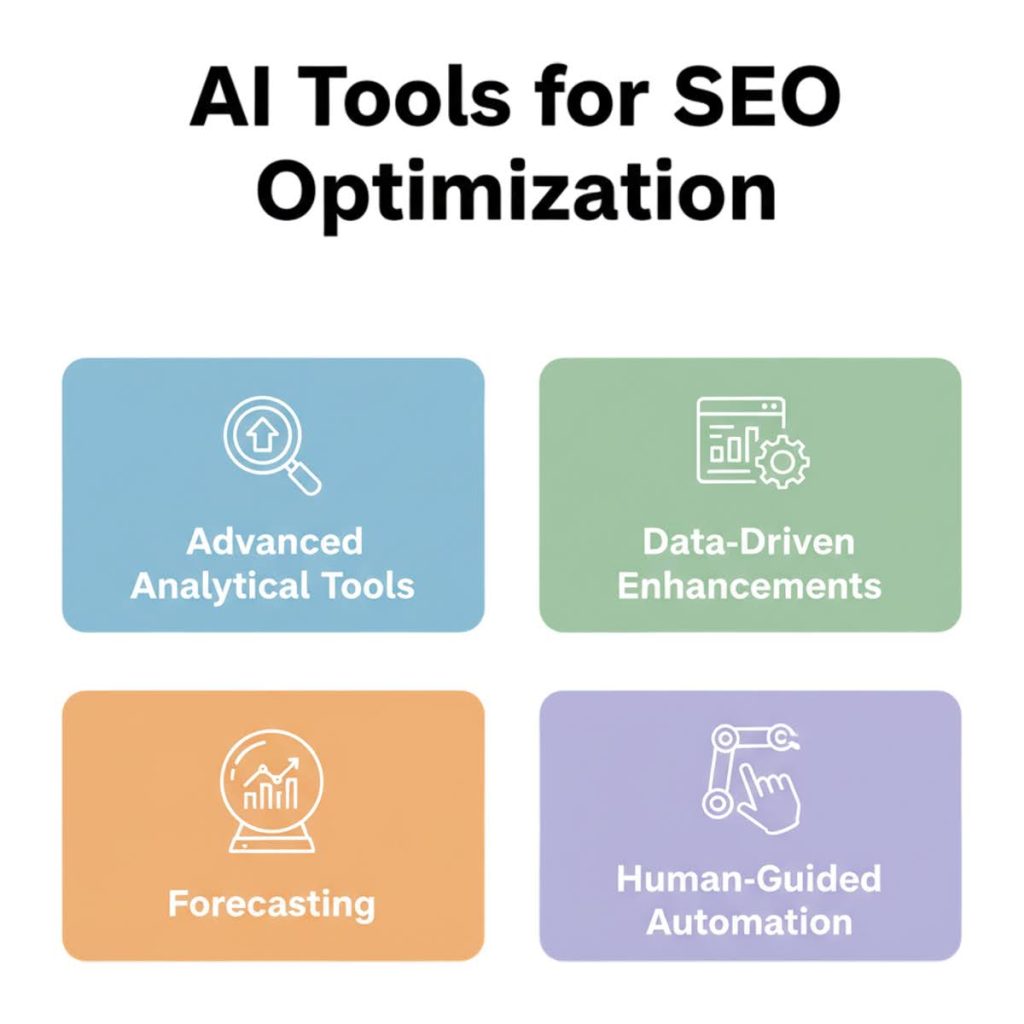
AI-powered platforms streamline and sharpen SEO strategy by converting large data sets into actionable recommendations. Leveraging these tools enables teams to identify content gaps, optimize for intent, and measure performance with greater precision than manual methods alone.
- Advanced Analytical Tools: Utilize platforms like SurferSEO, Clearscope, or MarketMuse to gain insights into keyword performance and content relevance.
- Data-Driven Enhancements: AI tools identify optimization opportunities and recommend strategic adjustments for improved ranking outcomes.
- Forecasting: Leverage predictive analytics to monitor search behavior and adjust content strategies proactively.
- Human-Guided Automation: While AI provides efficiency and precision, human creativity ensures authenticity and engagement remain intact.
#10 Keep Content Fresh
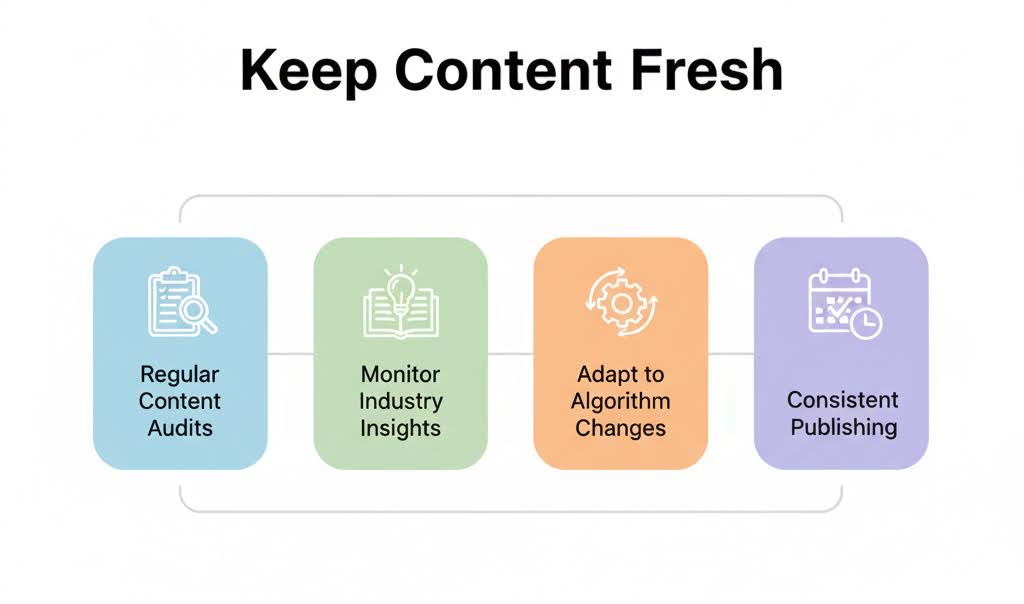
AI search engines value up-to-date, relevant content. Regularly reviewing and refreshing your material ensures it remains accurate, trustworthy, and competitive.
- Regular Content Audits: Review existing material periodically to update facts, statistics, and outdated information.
- Monitor Industry Insights: Stay informed about market and technological changes to maintain topical relevance.
- Adapt to Algorithm Changes: Adapt your SEO practices as AI algorithms evolve to maintain visibility and compliance.
- Consistent Publishing: Active, frequently updated sites demonstrate reliability and are favored by AI-driven search engines.
Conclusion
As artificial intelligence keeps transforming the way we process and share information, SEO strategies need to move beyond the old-school methods. It’s not just about cramming in keywords anymore; the spotlight is now on understanding user intent, ensuring clarity, and enhancing the overall user experience, elements that AI-driven search engines prioritize.
By adopting AI-friendly techniques like semantic optimization, structured data, and the principles of EEAT, brands can boost their visibility and build trust. The real challenge is to create content that’s not only easy to find but also meaningful and reliable in the eyes of smart algorithms.
In the end, the future of SEO is for those who can pivot and adapt. Merging human creativity with the precision of AI helps businesses remain relevant in a rapidly evolving search landscape, making sure their content continues to engage, inform, and rank well.
Deepak Wadhwani has over 20 years experience in software/wireless technologies. He has worked with Fortune 500 companies including Intuit, ESRI, Qualcomm, Sprint, Verizon, Vodafone, Nortel, Microsoft and Oracle in over 60 countries. Deepak has worked on Internet marketing projects in San Diego, Los Angeles, Orange Country, Denver, Nashville, Kansas City, New York, San Francisco and Huntsville. Deepak has been a founder of technology Startups for one of the first Cityguides, yellow pages online and web based enterprise solutions. He is an internet marketing and technology expert & co-founder for a San Diego Internet marketing company.



